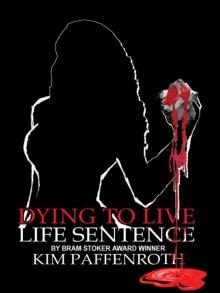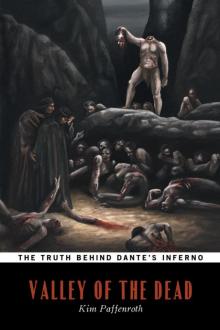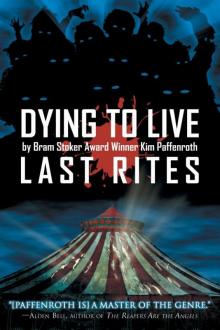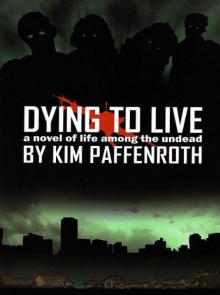- Home
- Kim Paffenroth
Dying to Live: Last Rites Page 2
Dying to Live: Last Rites Read online
Page 2
Rachel looked for Lucy’s reaction. There was only a brief pause. Not exactly awkward, but perceptible. Then the dead woman gave a slight nod, and she and Truman turned and shuffled off, climbing up the stairs on to the deck. There wasn’t much point denying that Lucy still frightened Rachel. Truman didn’t, not at all. He’d come up behind her and she’d never think of flinching or pulling away. Lucy, on the other hand—well, Rachel always knew where all the nearest weapons were when she was around. Weak as she was, the 20-gauge on the wall above the bed was out of the question, but Rachel was pretty sure she could get to the little Kel Tec .380 under her pillow.
She had stopped trying to push down such thoughts: they were just unavoidable when you saw that one beautiful eye; there was still some spark of anger and hate in it, something hurt and broken that waited and longed to lash out. Lucy probably couldn’t help it. Most of humanity was out there in a worse frenzy than she was, clawing at anything they could get a hold of. She at least was working really hard to keep it in check, so even if Rachel didn’t suppress or ignore her own instincts, she tried to admire the dead woman’s resolve and courage. And she tried really hard not to let the other woman notice how careful she was, for Lucy was as observant as she was beautiful.
Will scooted the stool the rest of the way into the space next to Rachel, and pulled the hatch closed. He patted Rachel’s hand. “What is it, Rach?” he asked.
She looked at him, then up at the ceiling. “Will, I don’t think it’s gonna happen. I mean, I don’t feel worse. But we have to discuss it. You know—what happens if I don’t make it.”
She couldn’t bear to look at him, but she could feel him shift and tighten his grip on her hand. “You’ll get better. The fever will break. You’ll be fine.”
Rachel sighed. The effort of trying to talk and reason was making the room spin, just a bit—first a little clockwise, then back. That really wasn’t helping with the nausea. She just needed to say what had to be said and get it over with. “I might be. I didn’t say I was giving up, but I want you to know what to do, okay?”
His grip on her hand slackened. “Okay.” Even if Lucy had been hanging right outside the door she wouldn’t have been able to hear him.
“I don’t know if I—want to be like them.”
They paused. “You want to just—be gone? Completely?” Will pulled his hand off hers, and she finally looked at him. He’d turned slightly. He was wiping his face with the back of his hand, though he was trying to hide it. Guys always did that. “What? Bang, and throw you over the side?”
It took all her strength and felt like her back was breaking as Rachel twisted to the side and put her hand on his shoulder. “Will, stop. Just discuss it. Please.” She couldn’t hold that posture for more than a second and she slumped back onto the bed.
He turned back, chastened and hurt, with red eyes looking down. “All right. I’ll do what you want. You know that. I love you.”
This time her smile came naturally and without pain. “I love you too. It’s just—it was different with them. We found them like they are. And they’re beautiful, both of them. Hell, Truman’s been dead for probably twelve years, and he’s so smart. He just wants to sit and read his books and write stuff. Who knows what he’ll come up with? And Lucy—well, she’s a little scary, but she plays her violin so beautifully, and she makes him happy.” She paused till she’d caught his gaze. “Will, I think that’s it: they have each other. If I die, I’ll be dead. Even if you kept me around like them, you’d still be alone. You said yourself, when we kept dead people around back in our city—we were treating them like dolls or statues or something, not like real people. I think I’ll still be me when I—well, if I die and come back. But we won’t be able to still be together. So please, when it happens—if it happens, let me go.”
Will didn’t try to hide wiping his hand across his face this time. “I could—you know, die too.”
“No!” her voice was as strong as she could make it. She raised herself up again and lowered her eyebrows, though all of that put her in agony, especially her head. “No one’s going to talk about killing themselves. You stop that. I won’t forgive you or talk to you if you say anything like that again.”
“Well, I can’t just shoot you. What’re you thinking of? How could I do that? How could you ask me to do that?”
Rachel’s face softened as she let herself back down, keeping her eyes on his. “I know. And I can’t think of killing myself before it happens. It’s funny, I don’t know if I’m just too scared, too much of a coward, and I’d keep hoping that I might get better, or if there’s something left of all those years in church and CCD. God—they told us not to commit suicide or get an abortion so often I thought that was all the Bible was about.” She couldn’t hold back a laugh this time, and it dissolved into a coughing fit, only stopping after Will gave her a sip of water.
They paused as Rachel caught her breath and stared at the ceiling again.
“So what do you want me to do?” Will asked finally.
She turned toward him again. “I’m not sure. I guess all you can do is let me go, let me wander off. If I don’t even remember who you are, then you’re not losing anything. And if I do—well, I’ll think of you and I’ll miss you, but it’ll be better and safer for both of us if I’m not around.” She extended her hand and he took it. “Is that okay? Can we agree to do that?”
He nodded. “I guess. I’ll miss you. I’ll worry about you.”
Again the smile didn’t hurt Rachel for some reason. “I know. It’s just the best we can do, I think.”
“Okay.”
Rachel closed her eyes again. “I’m gonna rest now. Maybe I’ll feel better when I wake up.”
Will’s lips pressing against her forehead was Rachel’s last conscious impression, before she slipped into a feverish sleep. All that talk had drained her strength. Some of what they’d discussed even worked its way into her dreams, where she found herself an eight-year-old again, sitting in church beside her father. Funny, how it was almost always him in her dreams and not her mother. Funny, too, how she was always about eight or nine, like it was shortly before he died in real life, and that always made the dream so enjoyable, because she knew what was to come and how she’d miss him.
In this dream now it was Easter, for the altar was surrounded by lilies, and she was wearing a white dress with green trim. It was one of those dreams where every sense is heightened, and she could feel the stiffness and newness of the fabric. She rubbed her palms on her thighs, relishing the cool softness of the cotton tights. She looked down at her white shoes—shiny, with brass buckles—then up at the stained glass windows of blue and red. She couldn’t make out all the words the priest was saying, but he was making some joke about the “onions and garlic.” He repeated that phrase a couple times, and she looked over at her father, who was chuckling as he looked forward, not noticing her.
The next thing she realized in the dream, she was outside the church, though she didn’t remember getting up and walking there. Everyone else was still inside, singing, but she was out on the lawn. The grass was wet, and there were puddles on the sidewalk nearby. Sitting next to one of the puddles was a large frog. Rachel had never really been a tomboy, but she also never minded bugs and other things people found gross, so she walked right over to the creature, which hopped away. She pursued it, laughing, and noticed that each time it landed, it got bigger. After several hops, it was about the size of a cat. At that point it didn’t hop anymore, but let Rachel approach. She was leaning very close to it, just staring into its large, shiny, bulbous eye, when she woke up, panting.
Rachel shook her head and looked over at Will. He’d fallen asleep, crammed up against the bulkhead, and Rachel was seized with a fear she’d had a couple times in the last few days, of what would happen if she died while he was asleep. Her fear had previously been just a vague anxiety, but now it shot all the way up to a gut-knotting terror when she considered that it might already have
happened. How would she know? She didn’t feel normal, after all, her body a wreck of pains and imbalances, her mind full of weird thoughts, memories, and feelings. When she put her hand out to touch him, was there still love in her longing, or had it turned into something more primal, savage, and evil?
Rachel pulled back her hand as she realized how hard her heart was pounding, and how fast and shallow she was breathing. She closed her eyes. “Thank you, God,” she said in a whisper.
Chapter 3: Truman
Truman did not like the idea of piloting the ship. He loved helping Will with it, but for him and Lucy to try it on their own? That didn’t sound good. Too much responsibility. And danger.
Before this day, all the wrecked ships he’d seen on the riverbanks hadn’t frightened him. They were from long ago, barely recognizable as boats anymore, overgrown with kudzu, homes for birds and other animals. Truman would look at them and never think of the people who had died in them, and would even take hope from how thoroughly the living world had reclaimed the broken hulks. Not anymore.
Now when he looked at them he could think only of destruction, sinking down into the murky water, maybe getting caught on something so he couldn’t get free; or he would think of the days of misery that would follow if they did escape the ship before it sank, days of trudging along the shore until they were found and killed by other dead people. Or live ones.
Will had explained to them, however, that since Rachel wasn’t getting better, they’d have to get the ship moving again. He expressed hope that there’d be people downstream—a camp, a city, whatever they had set up, and they might have doctors and medicine. Any group that had survived this long must have something more than they had on the boat. It didn’t seem like a very good plan to Truman, but he understood how Will couldn’t bear to watch Rachel suffer and do nothing about it. Truman felt the same frustration, and it must have been much worse for Will.
“All right, Truman, just keep us out in the middle away from the banks,” Will said, standing next to him as Truman gripped the wheel. It seemed easy enough, but what if something went wrong?
When he and Lucy had worked on the deck before, she had been able to raise and lower the sails, which she was doing now as Truman steered. “Good, Lucy,” Will said as she raised the mainsail. “We’re just going with the current, but raise the mainsail so long as the wind’s good. You don’t need the jib. And if the wind shifts, you can reef the sail. See, Truman—don’t be so worried.”
They sailed along for a few minutes, the only sounds the drone of insects, the occasional snap from the sail, and frequent bird calls from shore. Will clapped Truman on the back and smiled at him. “I’m going to go check on Rach. Just call me if anything changes. You’ll be fine.”
Truman nodded and watched Will slip down the stairs in the companionway. He turned his attention back to Lucy, who stood beside the mast with her back to him. As he often did, he wondered what she was thinking. They communicated more now, but he knew that didn’t keep her from being nearly as much a mystery to him as she was to Will and Rachel. She liked working on the ship, he knew that—the sails, taking care of the water, even mopping the deck. She had the dexterity for fishing, more so than he, but she didn’t have the patience for it; sometimes she’d get a worm on a hook and cast, and then hand the rod to Truman while she went to do something else. He liked that, when they’d cooperate on some task neither could accomplish alone, like when they dressed her late at night. He felt so close to her at times like that. But her impatience was a big part of her, too. She tried to keep down the hunger, thank goodness, but there was always something so angry about her—frustration at everything around them, and especially, Truman thought, at herself.
They were sailing along nicely when Truman noticed clouds off to the west. Typical summer day, with storms sometimes coming through, and these looked far enough away that he didn’t worry. Then the wind shifted suddenly, coming at them hard from the starboard. The wheel almost slipped out of his grasp, the force pushing against him was so strong, and he started really fighting the wheel to keep them in the middle of the river.
Lucy had immediately seen the problem as well, and she moved to reef the sail before they were driven too far to port. Truman looked with rising alarm as she struggled with the line. It must’ve fouled in the block, and the wind in the sail was putting so much tension on the line she couldn’t free it. He’d seen this problem before, when they’d helped on deck, but with Will there, it hadn’t posed much danger, as he could help and still leave someone on the wheel. But Truman couldn’t leave the wheel unattended or they’d fly downwind, maybe even run aground. He was about to call for Will and hope he got up on deck quickly enough, when Lucy finally freed the line and lowered the sail. The force pushing against the wheel eased, and Truman felt safer.
Lucy turned toward him and dragged the back of her hand across her forehead. She even graced him with a little smile and a thumbs up. He shook his head at her but returned the gesture.
Even without adrenaline flowing, there was no question that excitement and danger still intoxicated them—it’s just that such things made Truman feel weak and disoriented, while they seemed to make Lucy feel emboldened, invigorated, sometimes even a little playful, like the way she was acting now.
Truman watched Lucy secure the sail and settle down by the forward hatch. She often liked being a little distant from the others, even him. They had the whole night to sit together, after all.
She’d brought the portable CD player with her on deck, and now Truman heard some nice classical music in addition to the background noises of the river. It was a symphony, he could tell that much, but he didn’t know music like Lucy did. He thought it might be Mahler, as she’d been listening to that a lot lately.
As she listened to the music, Lucy began working on a pile of long, thin leaves they’d collected days before. She’d gotten good at weaving them into baskets for various things.
Truman relaxed a bit after their excitement. The ship was back on course, and the wheel didn’t feel so unnatural or dangerous to him anymore. He could do this, he thought—though he still doubted if it would do any good.
The storm coming in from the west would be a problem tonight, but by then Will would have anchored the ship and they’d be all right. Except for Rachel. Truman wished he had been a real doctor, and not just a professor of philosophy—a job which he wasn’t sure had been particularly useful or enjoyable in his previous life, and which had definitely not benefited them in their present existence in any tangible way. The only difference he could observe was that it perhaps made him a bit calmer than Lucy. But even that wasn’t entirely true. It just made him better able to articulate the anger that she felt as an inchoate, undifferentiated rage. He, on the other hand, could distinguish various ways in which the unfairness of Rachel’s situation maddened him. But what did that accomplish? Lucy roared; Truman seethed. There wasn’t much to recommend one over the other, and both were equally impotent, a fact that could only further infuriate them both.
As Truman reviewed all this, and tried to think if he could offer any better advice or propose a better plan than Will’s, he became focused on some wisps of cloud to the port side far ahead. They almost looked more like trails of rising smoke rather than rain clouds. He resolved to point them out to Will when he came back up.
While Truman studied the smoke, letting himself get more hopeful that they might find help, Lucy turned off the CD player and started fiddling with the portable radio. She’d always done that, had always been curious about the possible existence of other live humans. Truman didn’t know why, and if he had looked closely at her when she was turning the dials on the radio, he wouldn’t have seen the kind of hope or curiosity Will or Rachel would display, but something more like concern and anxiety. It was a fear Lucy indulged in rather vigorously and enthusiastically, and one that Will had encouraged now that they were actively seeking other people.
Truman was so engrossed with th
e clouds ahead that he didn’t notice the swirling, squelching static sounds of the radio at first. He didn’t even notice when those sounds resolved themselves into music. Not the stirring orchestral sounds of a moment ago, but a driving beat and a male voice singing something insistent and urgent, followed by a chorus of nonsense syllables in a more cloying tone.
“Truman!” Lucy shouted after a moment. It always sounded more like “Tra—Man” when she said it; she couldn’t really form her lips to make the long “O” sound.
Her cry yanked Truman out of his reverie and drew his attention to the radio she was holding up. Truman stared as a tinny song with a lot of snare drum and cymbal crashes leaped from the speakers. He was mesmerized by it. It took him immediately to a dark gym full of young people—happy people in brightly colored clothes, all of them laughing, moving their bodies to the music without talent or form, but with a vitality that demanded attention and longing. He no longer smelled the rankness of the river in summer, but instead the forgotten scents of perfume, cologne, flowers, a little bit of tobacco smoke, and that sweet smell of fake cherry flavoring laced with the sting of ginger and bubbles. The scene staggered him, both for its overwhelming, sensuous beauty, and for the guilty, bitter sadness he felt at having forgotten it for so long. It was one thing not to have thought of it since he died—most of his former life was swallowed up in that uncaring abyss of Lethe. But Truman knew as the music transported him that he had not thought of that darkened gym for years and years before his death, and that was his fault, his ingratitude and dishonesty.
“Will!” Truman shouted with equal amounts joy, fear, and hope. “People!”
Chapter 4: Will
Will bounded up the steps to the deck, his hand not far from the .357 Magnum on his hip. He saw no one besides Lucy and Truman, both of whom stared at him dumbly. The sail was down—that struck him as odd, but the ship was still safely in midstream, and the two dead people were just listening to music. It wasn’t like Truman to get all excited over nothing.

 Life Sentence
Life Sentence Valley of the Dead (The Truth Behind Dante's Inferno)
Valley of the Dead (The Truth Behind Dante's Inferno) Dying to Live: Last Rites
Dying to Live: Last Rites Dying to Live
Dying to Live